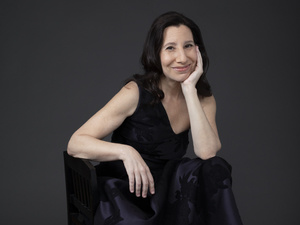Music On the Edge hosts performance by contemporary pianist Jeanne Golan

Image via University of Pittsburgh
Pianist Jeanne Golan performed in Bellefield Hall on Saturday evening.
November 17, 2021
When Jeanne Golan was growing up, the very thought of a career outside of piano made her burst into tears. Now a Steinway & Sons recording artist, she performed in Bellefield Hall on Saturday night — with a smile on her face during each piece.
Golan has played piano since early childhood. She came from a musical family, where she said it was the norm for everyone to have talent with a musical instrument.
“My mom was a pianist and a piano teacher. Music is a big part of how we communicate with each other and things that we share,” Golan said. “There was always music in the house, so playing the piano has always been a part of who I am.”
The Music On the Edge concert series within the Department of Music is dedicated to hosting concerts of visiting artists. The series featured Golan last Saturday for students, faculty and staff to enjoy, with pieces from her latest album, “It Takes One to Tango.” The album consists of tango-inspired piano pieces crafted by contemporary composers and what Golan refers to as “recovered voices” 一 composers whose work was censored by the Nazi regime.
Golan said she was inspired to seek out these musical pieces 10 years ago when one of her friends happened upon unknown music by Viktor Ullmann, a man who died in the Holocaust. Ullmann was the first of the “recovered voices” used in Golan’s work, and she has sought out forgotten music from the time period ever since.
“I think for both our tradition to survive and to grow, people need to connect to [tradition]. And what better way than hearing something that has never been heard before, or that this audience has never experienced before?” Golan said. “It’s about finding these diaries of composers present and past, and their most intimate thoughts.”
Golan said tango first intrigued her about four years ago, when a friend taught her how to tango dance. She started to learn the tango seriously and wanted to incorporate that sound in her own music.
“I usually find a piece that really intrigues me and that will often be the germ by which a project grows out and I’ll start thinking, ‘Oh, I love this concept,’” Golan said. “I often like mixed styles that always have some 20th century music as part of the package.”
“It Takes One to Tango” mixes the solo pieces of composers from the present and past. Golan said since she decided to take on the project of unearthing these piano pieces, she was put in contact with Holocaust survivors. She also worked with other contemporary musicians to put a modern twist on music from that time.
Golan said one of her favorite aspects about the album is that it mixes classical and contemporary sounds. Although all of the pieces are different stylistically, they are all inspired by the tango, so Golan said every piece connects to one another.
“What I’ve gotten out of putting the pieces together in the sound room is how much they kind of resonate with each other, as different as they are from each other,” Golan said. “When I hear it, it’s like having this fabulous dinner party, where everybody’s getting along and bringing something really special and conversational to the table.”
Golan is one of many musical artists to perform for Music On the Edge. Eric Moe, co-director of the program and a music department faculty member, is one of the featured composers on “It Takes One to Tango.” He composed the piece “Laminar Flow in Upside Down Creek.” He said Golan was a perfect fit for the concert series because of her ability to combine the work of contemporary and older, unknown composers.
“These are people whose music was suppressed by Nazis or other right-wing extremists in Europe during the ‘30s and ‘40s, and their music is dropped from view as a result,” Moe said. “Golan’s mission is to revive some of that music and also to combine it with contemporary music that’s not very well-known either.”
Moe said the concert could freshen the Pitt community’s perspective on classical music, as Golan’s music offers a new way of viewing history.
“When you think of a classical music piano recital, you think of mostly dead, white, European composers. The album brings out one of the great things about solo piano 一 it can sing and it can dance,” Moe said. “With Beethoven, you have pieces that were inspired by the pop music of his day. But, you know, that’s no longer the music of our day.”
Mark Micchelli, a third-year Ph.D. student and music teaching fellow, said he felt inspired watching Golan’s concert honoring contemporary composers, as a modern composer himself.
“I’m really inspired by the two main themes — honoring the composers who did not have a chance to become famous during their lifetime, whose music is still worth celebrating, and then obviously living composers,” Micchelli said.
Micchelli said his own piano teacher works with Golan, so he felt compelled to see her performance and thought it was something he could learn from.
“So many people in the audience are music students trying to be living composers, so anytime there’s a piano player playing work from a living composer, it’s very meaningful,” Micchelli said.


